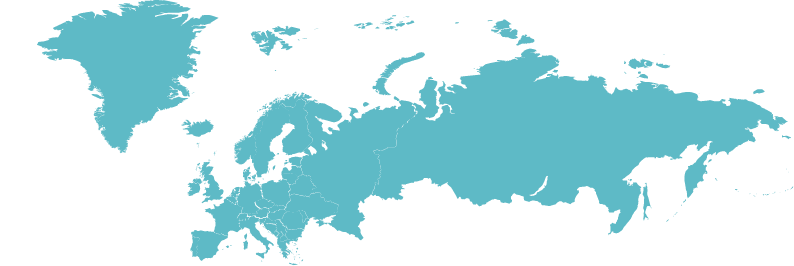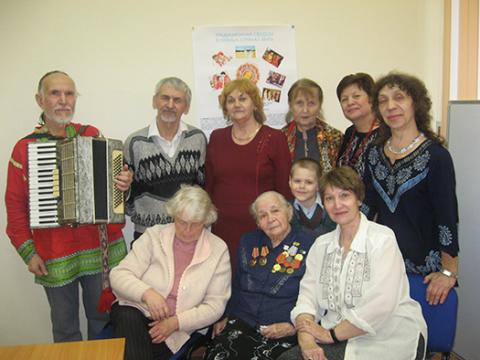
They say “better late, than never”, so in spite of the fact that Vera Surtaeva-Kushnarenko from Gornyi Altai (Altai Republic, Russia) and her two friends became official members of CC “Euro-Asia” of URI only in spring 2011, they have been working according to the same principles as URI, already for a long time. Diversity is Oneness-this logo had been inspiring them in all their attempts. The last big events in Altai they took an active part in- were the events, which happened in March 2011, when there was a Jubilee celebration of the great Altai Kaichi(story – teller) - Nikolai Ulagashev, who was singing his Epic stories accompanying himself with topshur. Ulagashev belongs to Altai minority, the syok called Tubalar, and Vera Surtaeva is his great-great-daughter.
Before telling about the Celebration, let us give some information about Tubalars and a challenging long way for the people to be recognized as Tubalars. Altaian ethnic groups have gone through, what can be called “ clinic death” in the XXth century, nowadays it is the time of “recovering” which is not an easy process. “Progress of humanity can not be led by incidents, the Creator have no “small deeds or small people”, for everything in the life serves to the Big”-says the Eastern Wisdom. In the course of Altaian history the biggest syoks(tribes) have become more vivid, while some small of them have almost been erased out of the people’s memory towards the end of the XXth century, so we see a great spiritual potential for Tubalars in the words of the Eastern Wisdom.
The time of the revival of Tubalar consciousness, has come; they should become recognized as a respected, knowledgeable syok within sacred Altai and within a big World Nation of People. Vera Surtaeva’s father was Tubalar, while her mother was Russian, and in the passports of all the children it was written “Russian”. Actually, nobody cared much about it before the new times came-Perestroika.
Vera had been a school teacher for many years, and today she is known in Altai Republic as a good writer and a volunteer social worker. When in the years of perestroika she faced a problem of disappearing Cedar woods of Altai, mostly in her native land, not far from Teletskoye lake, she started to think of herself as being Altaian and belonging to Tubalar syok. It is not good to become ” Ivan, who doesn’t remember his native roots”-as the Russian proverb says. It took Vera some time to do investigations on whatever materials she managed to find on the subject and collected a lot about her ancestor Nikolai Ulagashev (1861 -1946). Her father remembered Ulagashev very well and shared many stories about “uncle Nikolai” with the daughter. What she realized is that it is important not to revive the past as it used to be, but to transform old ways into the new and better ones. And she started to write articles for the local newspapers on the problems of “small nations”. The main idea pushing her was that while many people of Altai were so indifferent to what syok they belonged to, thinking of every-day bread,- natural treasures of the land are disappearing, being sold out, wild wood is becoming a place of modern tourism with all the accompanying disasters; old ways and spiritual traditions, typical for this area of Altai are disappearing too.
The name of Ulagashev is famous and very much respected in Altai; in the center of the capital, Gorno-Altaisk a monument has been erected in his memory. He used to speak Russian and a very good, old way of Tubalar language. Many called him “Altai Homer”, not only because he was blind, but mostly because he was narrating his stories of epic content. Ulagashev lived in one of the villages of Tubalars, but in 1997 only Karakoksha village survived, Choiskiy Region of Altai out of a few of them. People left the villages with the coming of a new social formation; so Vera Surtaeva-Kushnarenko suggested an idea of creating his Memorial Museum in this village, while speaking to the Republic Minister of Culture. Some time later the museum was opened, although in reality it was just a room.
The work on reviving Tubalar syok’s existence has been very much connected with the name of Ulagashev and the Museum, named after him. This is how they started to revive Tubalar syok existence, although the number of the Tubalars is just a few hundreds today. Since 1997 Vera Surtaeva and her friends have put a lot of efforts negotiating with the Republic authorities on the problems of reviving Tubalar language, publishing Tubalar ABC, legends and old stories. The stories were written down in the Russian language during the Soviet time, today the task is to translate them into native Tubalar language(tuba-kizhi), and this is a big challenge on all the levels, including financial, of course.
During the period of 2010 -spring 2011 Altai intelligentsia, especially those of them, who recognized themselves as Tubalars, participated in many good events, devoted to Ulagashev, his life and spiritual work as well as to the idea of reviving Tubalar self – consciousness. Vera’s material and stories were of a great use to them. On March 18, 2011 a 150 years Jubilee of Nikolai Ulagashev took place in the village Paspaul, Choiskiy Region, which has been organized on the level of Altai Republic Ministry of Culture. It has really been a great cultural event for Altai.
It has been decided to start organizing seminars and round tables in the village with the representatives of the “young generation” of Tubalar syok and all those, interested in this issue Vera Surtaeva and her friends have started the process and are very glad that today there are so many co-workers, continuing and developing the idea of Tubalar. In June 2011 the Festival “Tyuruk bairam-a Festival of Cedar” along with Kurultai(Gathering/ Competition) of kaichi took place in Altai. They demonstrated their skill in throat singing and one of the obligatory items was singing a part of Ulagashev’s epic stories.

